There is nothing to suggest thus far that AI will replace SEO or SEO specialists. While AI has become a powerful resource to supplement SEO and get redundant tasks out of the way faster, humans are still very much needed for strategy & editorial work.
How can AI help SEO specialists?
There are numerous areas in which AI can support the work SEOs would otherwise do manually. For example, AI can be used to generate schema markup:
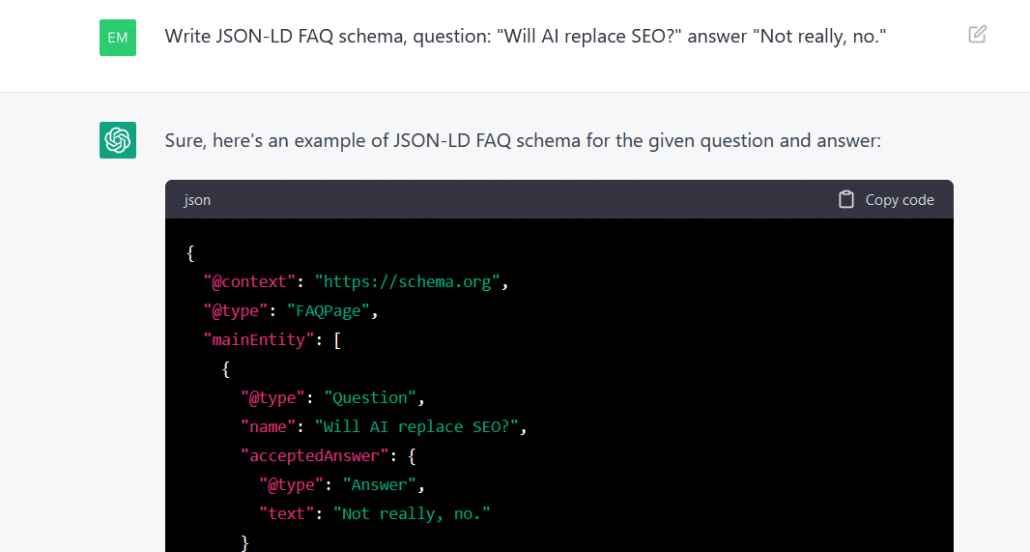
When you encounter a mental roadblock, AI can help generate related queries:
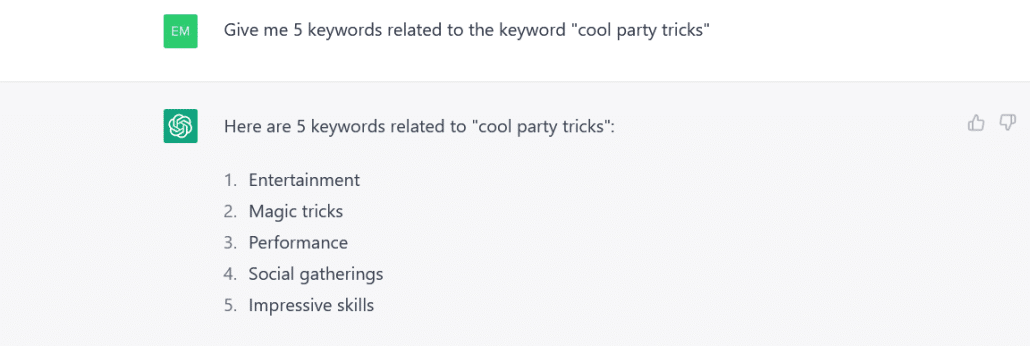
AI can also be used to brainstorm content ideas and write content briefs:
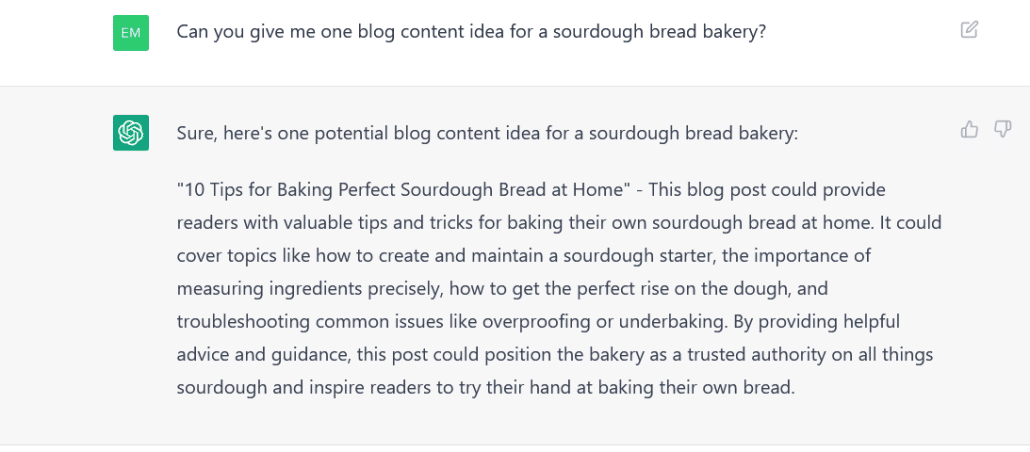
Arguably, the conversation around “will AI replace SEO” has risen with the rise in the popularity of AI writing assistants, like ChatGPT and Jasper. In reality, SEOs have relied on AI for quite some time now to automate some areas of their work – we just didn’t call it “AI”.
For example, Google’s PageSpeed Insights assesses a website’s loading speed and performance, highlighting the key metrics Google cares about the most. In that sense, SEO specialists will manually inspect a website’s already identified issues instead of looking for issues themselves.
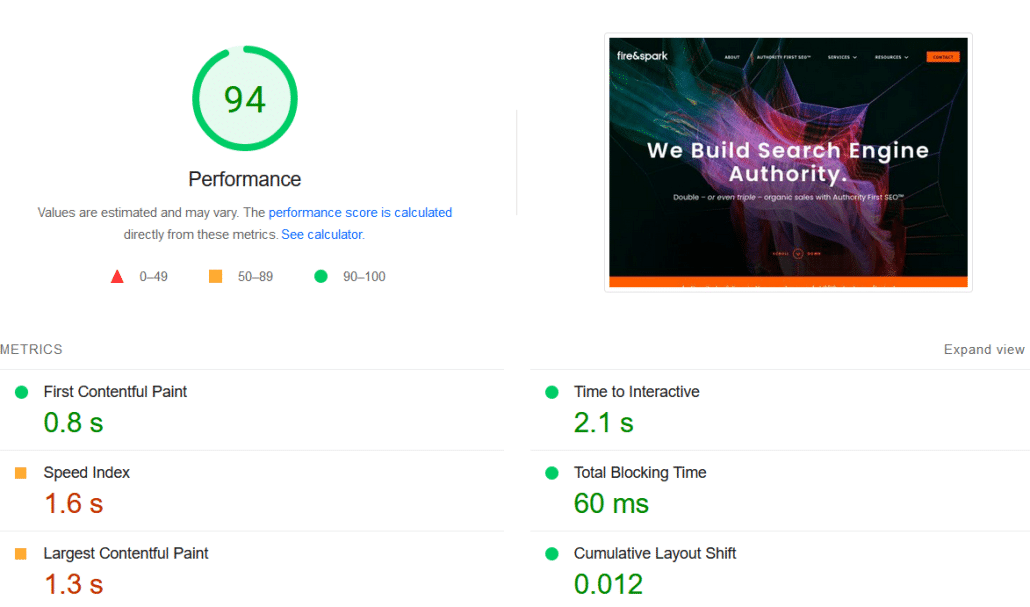
PageSpeed Insights Report showing Fire&Spark’s Desktop Lighthouse Score to be 94/100.
AI can’t craft a strategic SEO approach unique to your own business or industry. It can only mimic what already exists online. In that sense, AI’s “strategic mindset” is limited to competitor research, and not innovation. Share on XAI can be taught to perform task-based actions. However, AI also cannot spit out the why and how behind a particular idea, suggestion, or finding.
AI will merely make SEOs more efficient, but not replaceable.
Check Out Our Favorite AI tools for SEO & Content Marketing
AI Won’t Replace Writers, Either.
If not SEO managers, there is a growing concern that AI will definitely replace SEO content writers & copywriters. With AI capabilities in 2023, we doubt that this will come to fruition in the near future.
AI can help take redundant tasks off the writer’s hands. For example, AI can:
- Paraphrase original content to be used for several identical landing pages.
- Simplify tech-savvy content to be served to different audiences.
- Shorten content to fit a particular format, for example: turn a paragraph of text into a meta description, or blog preview excerpt.
However, there are several reasons why it is risky to write long-form AI content.
1. AI content can be predictable
AI – no matter how high quality and sophisticated – can be repetitive if the given prompt wasn’t very specific or if the prompt comes from the AI, too.
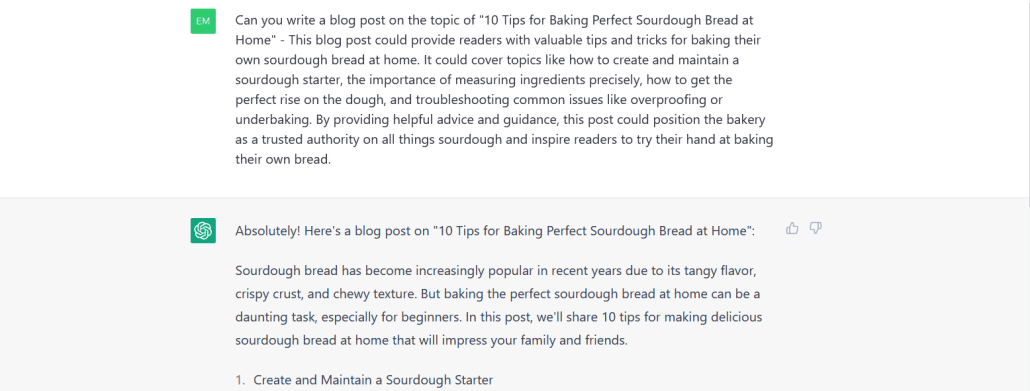
Prompt Given to ChatGPT: The idea summary for the blog “10 Tips for Baking Perfect Sourdough Bread at Home” ChatGPT generated itself. ChatGPT started to write out a long-form blog piece on Sourdough Bread Tips.
Most AI writing assistants will not generate the exact same two pieces of content for two different users, but they will follow very predictable patterns that some AI content detectors are already advanced enough to recognize:

CopyLeaks being able to detect ChatGPT’s content on Sourdough Bread Tips, estimating an 84.6% probability for AI (that AI wrote the content without human editorial).
Having detectable AI content is not a contradiction for good SEO performance – in fact, Google’s official stance on AI specifically says content will rank regardless of how it was produced as long as it’s helpful to users, and generated with the purpose of being helpful.
However, mass-producing unedited AI content that can be likely found elsewhere online is not helpful to users, it’s the equivalent of human-written spam content that’s based on just paraphrasing existing content from competitors with the purpose of manipulating rankings.
AI writing either needs to be heavily edited by a human content writer to adapt it to your own audience and personalize it to your brand, or a human will need to write a prompt that’s advanced enough for the AI to generate non-generic content. In either case, a human writer is irreplaceable in the content creation process.
2. AI content can be deceiving
There are instances in which AI content sounds more sophisticated than it actually is.
For example, we asked the AI to generate a biography of our CEO:

Prompt Given to ChatGPT: Write a 100-word biography of Dale Bertrand, SEO agency owner at Fire&Spark. ChatGPT’s Answer: Dale Bertrand is the founder and CEO of Fire&Spark, a boutique SEO agency located in Portsmouth, NH. He has over 20 years of experience in digital marketing, specializing in search engine optimization. Dale is a recognized expert in the field and has been invited to speak at conferences and events across the country. He has a passion for helping businesses grow and succeed online through strategic SEO planning and execution. In his free time, Dale enjoys hiking and spending time with his family.
While most of this is accurate, our agency is based in Boston, MA, not Portsmouth. Unless you manually fact-checked the answer, however, you may not doubt the information you were presented with.
3. AI models need to be trained
There are options to get your own API of an AI tool, like GPT. You can then fine-tune and train that model on your brand tone & voice, feed it learning materials, and edit its output to teach the AI to make near-ideal content for your unique use case.
Fine-tuning, training, and editing still all require a human evaluator and prompter. Fine-tuning models are still in their infant stage and we don’t know the exact formula of when a personalized model is “done” with its training, and if the output will ever not require human involvement – or it will just require less.
Experiencing AI anxiety? Don’t fret. Here are our predictions on how AI will transform the way marketers work!
Contact Fire&Spark for a discovery session on AI can assist your SEO efforts.